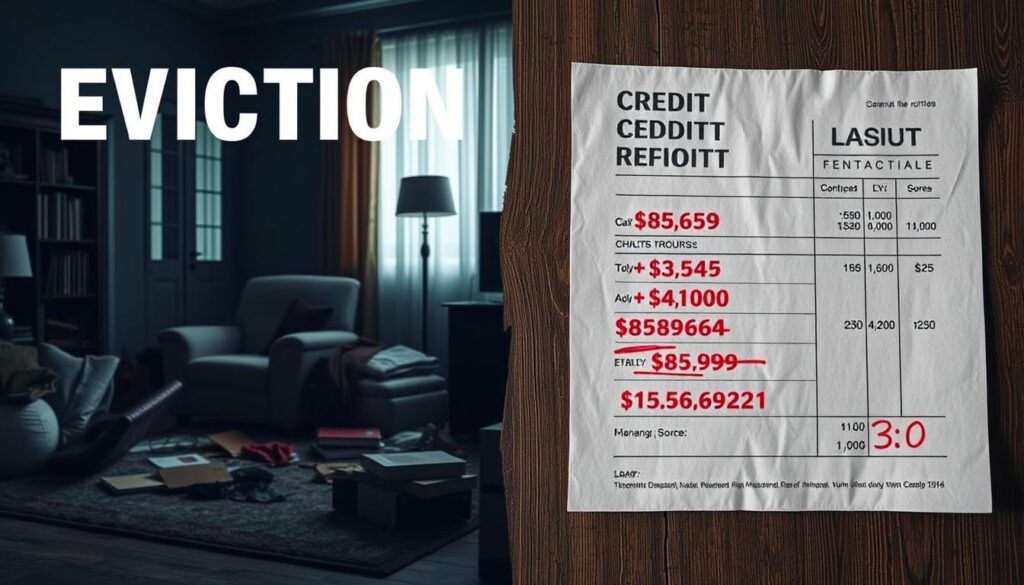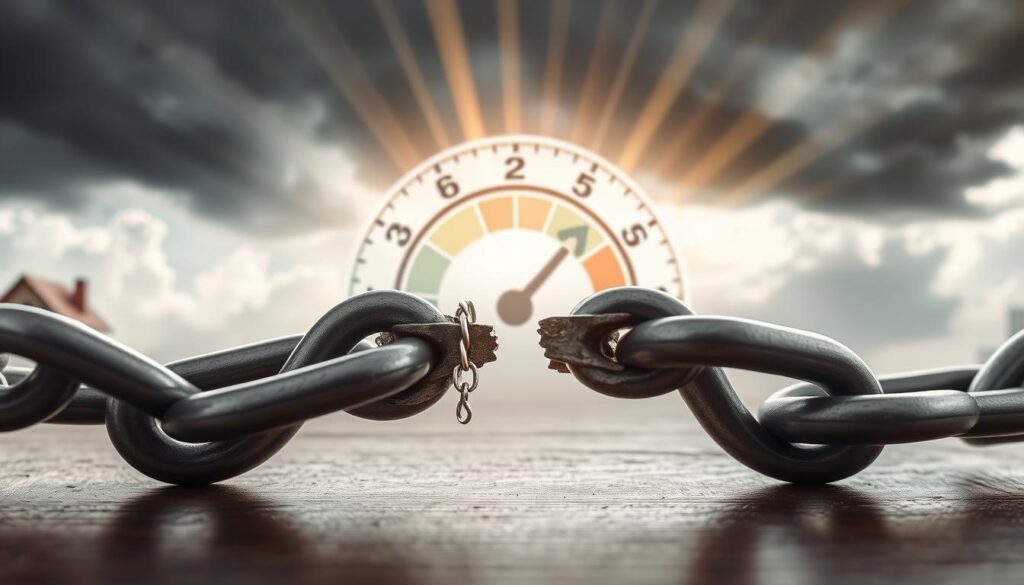Evictions can impact more than just your living situation. They can significantly hurt your credit score. Understanding this is crucial for managing consequences and rebuilding your financial standing.
Landlords report evictions to credit bureaus. These reports can stay on your credit report for up to seven years. This long-lasting impact can affect your ability to secure future housing or loans.
Key Takeaways
- Evictions can have a significant negative impact on your credit score, both in the short-term and long-term.
- Landlords report evictions to credit bureaus, which can remain on your credit report for up to seven years.
- Strategies like negotiating with your landlord and paying outstanding debts can help minimize the credit damage from an eviction.
- Disputing inaccurate information and building a positive credit history are crucial steps in repairing your credit after an eviction.
- Understanding the credit reporting process and your rights can help you navigate the aftermath of an eviction more effectively.
Understanding Evictions and Their Impact
Evictions can deeply affect individuals and their financial health. They impact credit history and future prospects. Let’s explore the legal aspects of evictions and their consequences.
What is an Eviction?
An eviction is a legal process to remove tenants from rental property. Reasons include unpaid rent or lease violations. It involves several steps, from notice to vacate to court action.
Legal Consequences of Eviction
Evictions can have serious, long-lasting legal effects. They may result in court judgments reported to eviction and credit rating agencies. This can stay on credit reports for seven years.
These judgments can harm an individual’s eviction credit consequences. They make it harder to rent, get loans, or find jobs.
- Court judgments from evictions may affect credit scores.
- Unpaid rent or damages can be reported as outstanding debts.
- Landlords may avoid renting to those with eviction history.
Knowing these legal impacts is key to handling evictions. It helps minimize long-term eviction credit consequences.
does an eviction hurt your credit
An eviction can seriously damage your credit score. This negative mark can stay on your credit report for up to seven years. It may make getting loans, credit cards, or rental properties harder in the future.
Landlords often report successful evictions to credit bureaus. This information becomes part of your credit history. As a result, your creditworthiness can take a big hit.
| Potential Impact of Eviction on Credit Score | Explanation |
|---|---|
| Reduced Credit Score | An eviction can lead to a decrease in your credit score, making it more difficult to obtain credit or secure favorable interest rates. |
| Difficulty Obtaining Future Rentals | Landlords often conduct credit checks and may be hesitant to rent to individuals with a history of eviction. |
| Challenges Securing Loans or Credit Cards | Lenders may view an eviction as a sign of financial instability, leading to a higher risk assessment and potentially denying credit applications. |
The impact on your credit score can vary. It depends on the eviction circumstances, your overall credit history, and credit bureau policies. Lender policies also play a role in determining the effect.

Understanding the consequences of eviction is crucial. Take proactive steps to minimize credit damage. Seek professional financial guidance to navigate this challenging situation.
Exploring credit repair options can help rebuild your financial standing. With time and effort, you can recover from the effects of an eviction.
Credit Score Impact of Eviction
An eviction can severely damage your credit score. It creates long-term financial challenges for renters. Understanding its effects is vital for managing your financial health.
Short-term Effects
An eviction can cause your credit score to drop significantly. Credit bureaus receive reports of the eviction filing, unpaid rent, and related costs. This negative information makes it harder to rent, get credit cards, or qualify for loans.
Long-term Effects
Eviction’s credit effects can last for years. Your credit report may show the eviction for up to seven years. This ongoing credit score impact of eviction makes rebuilding credit difficult.
The eviction credit damage can hinder getting favorable terms on mortgages or car loans. Renters should understand these consequences to make informed decisions. Taking proactive steps can help mitigate the credit effects of eviction.
Eviction Credit Consequences
An eviction can deeply impact your credit for years to come. It stays on your credit report for up to seven years. This makes it harder to rent, get loans, or use financial services.
The impact on your credit score varies based on several factors. These include when you were evicted and your overall credit history. Evictions can drag down your credit score by as much as 100 points or more, This makes getting new credit much tougher.
- Landlords may be less willing to rent to you, as an eviction on your record can be seen as a red flag.
- Potential lenders may view you as a higher-risk borrower, making it harder to get approved for loans, credit cards, or mortgages.
- Utility companies may require larger security deposits or refuse to provide service altogether, further complicating your financial situation.
An eviction’s long-term effects on your credit can be severe. It’s crucial to take steps to fix the damage. Focus on rebuilding your creditworthiness as soon as possible.
“An eviction can haunt your credit report for up to seven years, making it one of the most damaging events for your financial well-being.”

Minimizing Eviction’s Damage to Your Credit
Facing eviction? Act fast to protect your credit score. Two key strategies can help: negotiating with your landlord and paying off debts quickly. These steps can lessen the blow to your credit history.
Negotiating with Your Landlord
Talking to your landlord can help avoid a formal eviction record. Be honest about your situation and explore solutions together. Some landlords may accept a settlement or alternative plan.
This approach can prevent damage to your eviction credit history. It shows you’re willing to work things out responsibly.
Paying Outstanding Debts
Quickly pay off any eviction-related debts or fees. This shows you’re committed to resolving the issue. It can also stop the debt from going to collections.
Prompt payment is crucial for your eviction credit repair efforts. It helps minimize long-term damage to your credit score.
By taking these steps, you can protect your credit. You’ll be on your way to rebuilding your financial standing.
Eviction and Credit Rating
An eviction can seriously harm your credit rating. It’s vital to understand how this legal process affects your creditworthiness. Knowing this helps you manage the aftermath and rebuild your credit score.
Credit agencies view evictions as a major financial misstep. This negative mark can stay on your credit report for seven years. It can make getting housing, loans, or jobs much harder.
| Impact of Eviction on Credit Rating | Short-term | Long-term |
|---|---|---|
| Eviction and credit rating | Immediate drop in credit score | Lingering damage for up to 7 years |
| Eviction credit damage | Difficulty securing new housing or loans | Ongoing struggles to rebuild credit history |
The damage to your credit rating depends on several factors. These include the eviction’s severity and your overall credit history. How quickly you address the issue also matters.
Taking proactive steps can help lessen the long-term impact. Try negotiating with your landlord or settling outstanding debts. These actions can improve your credit rating over time.
“An eviction can be a significant setback, but it doesn’t have to define your financial future. With the right strategies, you can navigate the aftermath and reclaim your creditworthiness.”
Grasping the link between eviction and credit rating is crucial. It allows you to take informed actions to minimize damage. You can work towards rebuilding a strong credit profile.
Address the eviction promptly and proactively. This shows lenders your commitment to financial responsibility. It’s a key step in recovering your creditworthiness.

Eviction Credit Repair Strategies
An eviction can hurt your credit score. But don’t worry, you can fix the damage. There are ways to rebuild your creditworthiness and secure your financial future.
Disputing Inaccurate Information
Check your credit report for mistakes about the eviction. Look for wrong dates or payments, or if the eviction is listed by error. Challenge these errors with credit bureaus.
Provide proof to back up your claims. Removing wrong info can boost your eviction credit history and help with eviction credit repair.
Building Positive Credit History
Evictions may stay on your credit report for years. But you can offset this by building good credit. Pay all your bills on time and avoid applying for new credit.
Consider using a secured credit card to show responsible borrowing. These actions can improve your credit profile over time.
| Eviction Credit Repair Strategies | Key Benefits |
|---|---|
| Disputing Inaccurate Information | Removes errors from your credit report, improving your eviction credit history |
| Building Positive Credit History | Demonstrates responsible financial management, offsetting the negative impact of the eviction credit repair |
These strategies can help you bounce back from an eviction. Take action now to rebuild your creditworthiness and secure your financial future.
Credit After Eviction: Bouncing Back
An eviction on your credit report can be a major setback. But it’s not the end of your financial journey. With determination and the right strategies, you can rebuild your credit.
The first step is to secure new housing. Be honest about your situation with potential landlords. Offer a larger security deposit or find a co-signer to improve your chances.
Focus on paying down any debts related to the eviction. This includes back rent, fees, or court costs. Clearing these debts will help you start rebuilding your credit history.
Consider applying for a secured credit card to improve your credit after eviction. These cards require a refundable security deposit as your credit limit. Use the card responsibly to start rebuilding your credit score.
Dispute any inaccurate information on your credit report related to the eviction. Work with credit bureaus to correct errors or discrepancies. This can help improve your overall credit profile.
With patience and responsible financial management, you can bounce back from an eviction. Focus on building a positive credit history. This will position you for a brighter financial future.

Eviction Credit Reporting: What You Need to Know
Evictions can significantly impact your credit history and creditworthiness for years. Understanding how evictions are reported to credit bureaus is vital. This knowledge helps you take steps to protect your financial future.
Landlords typically report evictions to Experian, Equifax, and TransUnion. The information stays on your credit report for up to seven years. Lenders, landlords, and employers can see this during credit checks.
Credit reports include the eviction date, amount owed, and legal outcome. This data can greatly affect your credit score. It may make getting housing, loans, or jobs harder.
| Credit Bureau | Eviction Reporting Timeline |
|---|---|
| Experian | Up to 7 years |
| Equifax | Up to 7 years |
| TransUnion | Up to 7 years |
Regularly check your credit history for accuracy. Address any errors quickly. Being proactive can help lessen the long-term effects on your finances.
Conclusion
An eviction can greatly affect your credit score and financial health. It’s a complex issue that needs quick action to reduce long-term effects. With effort and smart moves, you can recover from an eviction and rebuild your finances.
We’ve covered the legal aspects of eviction and its impact on your credit score. We’ve also outlined steps to lessen the damage. Talking to your landlord and paying off debts are key to rebuilding your credit history.
Recovery after an eviction is tough but achievable. Stay informed and use available resources to become financially stronger. Your credit after eviction isn’t a permanent mark.
It’s a chance to show your financial responsibility and regain lenders’ trust. With the right approach, you can overcome this setback. You can move towards a brighter financial future.

